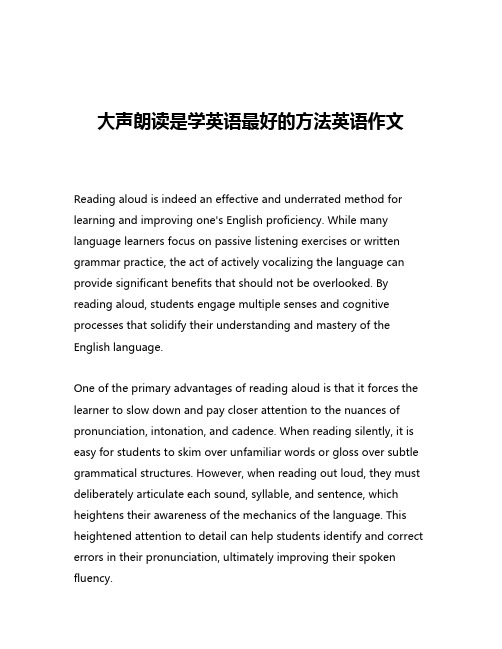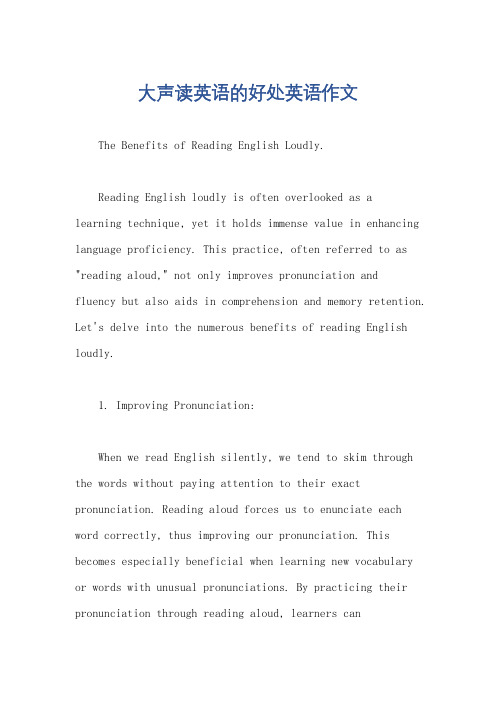大声朗读英文课文原来有这么多好处!
大声朗读是学英语最好的方法英语作文

大声朗读是学英语最好的方法英语作文Reading aloud is indeed an effective and underrated method for learning and improving one's English proficiency. While many language learners focus on passive listening exercises or written grammar practice, the act of actively vocalizing the language can provide significant benefits that should not be overlooked. By reading aloud, students engage multiple senses and cognitive processes that solidify their understanding and mastery of the English language.One of the primary advantages of reading aloud is that it forces the learner to slow down and pay closer attention to the nuances of pronunciation, intonation, and cadence. When reading silently, it is easy for students to skim over unfamiliar words or gloss over subtle grammatical structures. However, when reading out loud, they must deliberately articulate each sound, syllable, and sentence, which heightens their awareness of the mechanics of the language. This heightened attention to detail can help students identify and correct errors in their pronunciation, ultimately improving their spoken fluency.Moreover, the act of vocalizing the language engages the motor skills and muscle memory needed for natural speech. By repeatedly practicing the physical movements and rhythms of English, students reinforce the neural pathways associated with speaking the language. This kinesthetic component is often overlooked in traditional classroom settings, where the focus tends to be on passive listening or written exercises. Reading aloud, on the other hand, bridges the gap between comprehension and production, allowing students to seamlessly transition from understanding the language to actively using it.In addition to the benefits for pronunciation and speech production, reading aloud also enhances comprehension and retention of the material. When students actively engage with the text by voicing it, they are more likely to process the information deeply and make meaningful connections. The act of reading aloud requires a higher level of cognitive engagement, as the learner must simultaneously decode the written words, understand their meaning, and articulate them correctly. This multifaceted process helps to cement the vocabulary, grammar, and sentence structures in the student's memory, making it easier to recall and apply them in future conversations or written assignments.Furthermore, reading aloud can be a valuable tool for improvingreading fluency and overall language proficiency. As students practice reading texts out loud, they become more comfortable with the flow and rhythm of the language, which can lead to increased reading speed and better comprehension. Additionally, the feedback loop between hearing oneself speak and adjusting one's pronunciation can help students identify and correct any lingering issues, further enhancing their language skills.It is important to note that reading aloud should not be limited to individual practice; it can also be a powerful collaborative activity in the classroom setting. By engaging in group or pair reading exercises, students can learn from each other's pronunciations, receive feedback, and build confidence in their speaking abilities. This interactive approach can foster a supportive learning environment and encourage students to take more risks in using the language.Moreover, reading aloud can be a valuable tool for language learners of all proficiency levels. Even advanced students can benefit from the practice, as it helps them maintain and refine their skills, and can even uncover areas for further improvement. For beginners, reading aloud can be a crucial stepping stone in their language acquisition journey, as it provides a structured and guided way to become more familiar with the sounds, rhythms, and patterns of English.In conclusion, the practice of reading aloud should be a centralcomponent of any comprehensive English language learning program. By engaging multiple senses and cognitive processes, reading aloud can enhance pronunciation, fluency, comprehension, and overall language proficiency. Whether practiced individually or in a collaborative setting, this active approach to language learning can be a powerful tool for students of all levels, helping them to develop the confidence and skills needed to effectively communicate in English. As such, educators and language learners alike should embrace the benefits of reading aloud and incorporate it into their language learning strategies.。
朗读在英语学习中之重要性

朗读在英语学习中之重要性在英语学习中,朗读有助于学生培养语感,有助于增强记忆,也有助于提高听力水平,是一种重要的学习方式。
英语教学必须培养学生较强的阅读能力和一定的听说读写的能力。
然而很多学生忽视了语言学习的整体性,忽视了语言学习的实践性。
现在不少学生只知戴着耳机听英语,埋头阅读英语,很少甚至从不朗读英语,把语言分割成了听说读写独立的几个部分,结果事倍功半,既不会听说,也不能读写,学成了“聋子英语”或“哑巴英语”。
朗读是和听说读写紧密联系在一起的,在英语学习中起着至关重要的作用。
一、朗读有助于培养语感朗读与背诵是古人学习语文最常用、最基本的学习方法。
所谓“书读百遍,其义自见”说的就是这个道理。
古人一贯倡导多读、熟读,通过大量、反复的朗读与背诵培养出语感。
语感(Linguistic Sense)是人们对语言的直接感觉,是系统、综合的语言感知力,是直接、敏锐的语言领悟力。
语感是语言的发展开始走向成熟期的一种心理现象,是对语言的语音、语义、语法、语气等综合运用所自然产生的激活效应,是对语言熟练掌握而自然生成的,不假思索的语言敏感性。
这种对语言的敏感性越强,就越能创造性地学习和使用语言。
语言学习与一般知识学习有着不同的生理、心理机制。
在语言学习中,语言的各种要素如语音、词汇、句型、语法及语篇等都不可能是单一、独立、分割开来的,相反,它们以错综、交叉的形式形成综合性网状结构。
在英语学习中,语言能力的发展既不是语言逻辑的推理和演绎,也不是语言规则的理解和训练,而是通过语言实践而逐渐形成的语言直觉与敏感,即语感。
语感越强,就越能加速学习和吸收语言并创造性地运用语言。
语感不是与生俱来的,它是通过后天语言习得(Language Acquisition)而生成,通过语言学得(Language Learning)而发展的。
所以,培养语感必须通过习得与学得两条渠道,既要保证足够的语言材料输入,又要强化语言实践。
朗读是综合性的、高效率的语言实践练习。
大声读英语的好处英语作文

大声读英语的好处英语作文The Benefits of Reading English Loudly.Reading English loudly is often overlooked as alearning technique, yet it holds immense value in enhancing language proficiency. This practice, often referred to as "reading aloud," not only improves pronunciation andfluency but also aids in comprehension and memory retention. Let's delve into the numerous benefits of reading English loudly.1. Improving Pronunciation:When we read English silently, we tend to skim through the words without paying attention to their exact pronunciation. Reading aloud forces us to enunciate each word correctly, thus improving our pronunciation. This becomes especially beneficial when learning new vocabularyor words with unusual pronunciations. By practicing their pronunciation through reading aloud, learners canconfidently use these words in conversation.2. Enhancing Fluency:Reading English loudly helps to familiarize our mouths and tongues with the language, making it easier to speak fluently. As we repeatedly read aloud, we train our mouths to form the correct sounds and sequences, leading to smoother and more natural-sounding speech. This is especially useful for those who are learning English as a second language and may struggle with the flow and cadence of the language.3. Improving Comprehension:Reading aloud requires us to slow down and pay close attention to each word and sentence. This slow and deliberate reading helps us to better understand and internalize the content. As we read, we are forced to process the information more deeply, which leads to a better understanding of the text's meaning and context.4. Boosting Memory Retention:Reading English loudly stimulates multiple senses, making the information more memorable. The combination of hearing the words, seeing them written, and saying them aloud helps to create a stronger neural connection in the brain. This multisensory approach to learning not only improves memory retention but also makes the learning process more engaging and enjoyable.5. Improving Public Speaking Skills:Reading English loudly also helps to build confidence in public speaking. By practicing speaking in front of a mirror or to a group of people, learners can overcome stage fright and develop a more confident delivery. This practice also helps to identify and correct any speaking habits that may hinder clarity or effectiveness, such as stumbling over words or speaking too fast.6. Encouraging Regular Practice:Reading English loudly is a highly accessible and convenient practice that can be done anywhere, anytime. It does not require any special equipment or a partner; allyou need is a quiet space and a text to read. This ease of practice encourages regular engagement, which is crucialfor language learning. The more we practice, the better we become at speaking and understanding English.7. Increasing Motivation and Engagement:Reading English loudly can be a fun and rewarding experience. As learners see progress in their pronunciation, fluency, and comprehension, they are more likely to feel motivated and engaged with the learning process. This positive feedback loop can lead to even more significant improvements in English proficiency.In conclusion, reading English loudly offers a wide range of benefits that span from improving pronunciationand fluency to enhancing comprehension and memory retention. It is a simple yet effective practice that can be easily integrated into daily learning routines. By making the mostof this technique, learners can加速 their progress in learning English and enjoy the journey of language acquisition.。
朗读英文作文好处

朗读英文作文好处英文:Reading aloud has numerous benefits, both for language learners and native speakers. Firstly, it helps to improve pronunciation and fluency. By reading aloud, you can practice enunciating words clearly and at a natural pace, which can improve your overall speaking ability. Additionally, it can help you to develop a better understanding of intonation and stress, which are important aspects of spoken English.Secondly, reading aloud can also improve your comprehension skills. When you read aloud, you are forced to pay more attention to the text, which can help you to better understand the meaning of the words and phrases. This can be especially helpful for language learners who are still building their vocabulary and struggling to understand more complex texts.Finally, reading aloud can be a fun and engaging way to practice your English skills. It can help you to build confidence in your speaking ability and can be a great way to practice with friends or in a language exchange group.In terms of personal experience, I have found that reading aloud has been a helpful tool in improving my own language skills. When I was learning Spanish, I would often read aloud to practice pronunciation and to better understand the meaning of the text. I also found it to be a fun and engaging way to practice, which helped me to stay motivated and engaged in the learning process.中文:朗读英文作文有很多好处,无论是对于语言学习者还是母语为英语的人来说。
关于早读大声朗读的好处的英语作文

关于早读大声朗读的好处的英语作文英文回答:Reading aloud during morning reading sessions offers numerous benefits for students, including:Enhanced Phonological Awareness: This refers to understanding the sound structure of language. Reading aloud helps students develop a better understanding of phonemes, the individual sounds that make up words. By articulating these sounds, students improve their ability to decode and recognize new words.Improved Fluency: Reading aloud promotes fluency, the ability to read smoothly and accurately. By practicing reading aloud, students develop increased speed and confidence in their reading skills. The repetitive nature of reading helps them develop automaticity, allowing them to recognize words more quickly and effortlessly.Enriched Vocabulary: When students read aloud, they encounter a wider range of vocabulary than they might in silent reading. This exposure to new words helps expand their vocabulary, giving them a broader lexicon to use in their own writing and speaking.Enhanced Comprehension: Reading aloud facilitates comprehension by allowing students to hear and process the text in a different way than silent reading. By vocalizing the words, they are more likely to engage actively with the material, resulting in a deeper understanding of the content.Increased Motivation and Engagement: Reading aloud can be an engaging and motivating activity for students. They enjoy the social aspect of participating in a shared reading experience and the opportunity to share their interpretations of the text. This increased motivation can lead to a greater interest in reading and a desire to continue practicing.Improved Concentration and Focus: The act of readingaloud requires sustained attention and focus. Students must concentrate on the words and maintain their focusthroughout the reading. This helps develop their ability to stay focused and reduces distractions.Increased Confidence: Reading aloud builds confidencein students' reading abilities. As they gain fluency and accuracy, they develop a sense of accomplishment and pridein their reading. This increased confidence can motivate them to read more independently and explore differentgenres and authors.Social Development: Reading aloud in a group setting promotes social development and collaboration. Studentshave the opportunity to interact with their peers, share their ideas, and learn from each other. This collaborative experience fosters a sense of community and supports their social and emotional growth.Cultural Awareness and Appreciation: Reading aloud allows students to explore different cultures, perspectives, and experiences through literature. By engaging with textsfrom diverse authors, they gain a greater understanding of the world around them and develop empathy for others.Enjoyment and Relaxation: Reading aloud can be a relaxing and enjoyable activity. It provides a sense of calm and tranquility, helping students de-stress and escape from the demands of the day.中文回答:大声朗读能给学生带来许多好处,包括:提高语音意识,这指的是理解语言的音素结构。
大声朗读英语句子有什么好处?对我们学习英语有哪些帮助?

大声朗读英语句子有什么好处?对我们学习英语有哪些帮助?现在很多人都在“闷头干大事”,就比如学习英语,很多人都是闷声阅读。
说实在的,这种越阅读方法只是刺激了视觉,对英语的听力和口语没有任何帮助,要是想对英语的听力以及口语有帮助,就要大声阅读。
可能很多人不信,那么现在我就来给大家讲讲大声朗读英语句子有什么好处?对我们学习英语有那些帮助?1.有利于开发右脑读书时,如果大声读出来,不但可以加深印象,还可以培养胆量哦。
现在很多孩子不管是读英语还是读语文都习惯哑巴读法,就是用心读、不出声。
你是如何教育自己孩子大声朗读的呢?其实让孩子大声读出来很有好处!因为大声读实质是朗读者在自我欣赏自己的声音,久而久之,有利于孩子形象思维能力的自我培养。
在诵读过程中,把文字变成了声音,并且伴之以节奏、韵律、形象、情感,使人进入了一种美的艺术体验,这就很好地开发和训练了右脑。
α波(8~13赫兹)被称为放松波。
α波频率较慢,在这种状态下会产生快乐感、幸福感、深沉的放松、直觉地涌现出创意等。
科学家发现,脑波的节奏越缓慢,知觉上时间也会缓慢进行。
现代医学已经证明,使用右脑时涌现出大量的α波,这恰恰开启和使用了右脑。
2.能改变孩子的性格性格内向者往往发出的声音也很小,如果孩子都能坚持大声读课文及其他文章、书籍,很容易使孩子爱讲话,性格也就随之而变。
内向的人大多都是不会、不想和不善于使用语言的人,当一个人能够肌肉放松、铿锵有力、抑扬顿挫、情感饱满地诵读时,也就是能把自己的勇气、力量、感情、理解读出来时,他就变得外向了。
3.体会辩论的价值这是更好的、高质量地参与未来的事务的一种素质。
人类进化史表明,正是由于语言的发展和丰富,才使人的大脑功能得到了发展和完善,从而成为万物之灵的。
4.让脑神经兴奋这本身就能刺激孩子深入理解文章、书籍,人在诵读时口腔、肌肉、舌头、气流等的运动可以激活大脑多个区域的活动(特别是额叶、颞叶和顶叶)。
在诵读时还可以使大脑皮质的抑制和兴奋达到平衡,血流量及神经功能的调节处于良好的状态。
大声朗读的十大好处!每天十分钟,塑造一个积极向上好孩子!

大声朗读的十大好处!每天十分钟,塑造一个积极向上好孩子!愿天下没有难做的教育,愿天下没有难教的孩子。
愿天下父母都有一个……好孩子,愿天下孩子都有一双好父母。
点击上方公众号教育与人生,关注教育与人生,探索孩子成长奥秘,迎接幸福快乐人生。
大声朗读好处多!但是在学校里,由于课堂教学的时间有限,老师不可能让每个孩子都有当众朗读的机会,所以,粑粑麻麻们在家里就要“挤”出一点时间来陪孩子读读书哦!1有利于开发右脑大脑的α波(8~13赫兹)被称为放松波。
现代医学已经证明,使用右脑时涌现出大量的α波,α波频率较慢,在这种状态下会产生快乐感、幸福感、深沉的放松、直觉地涌现出创意等。
大声朗读时,实质是朗读者在欣赏自己的声音,久而久之,有利于孩子形象思维能力的培养。
大声朗读时,语速较慢(通常是每分钟150-200字,而默读一般在500-800之间),在诵读过程中,把文字变成了声音,并且伴之以节奏、韵律、形象、情感,使人进入了一种美的艺术体验,这就很好地训练和开发了右脑(关于右脑的作用,在第6、第7点还会介绍)。
2增进脑呼吸诵读在某种意义上和唱歌有相同之处,它的运动原理是通过腹式呼吸带动人体各肌肉组织运动,同时锻炼呼吸道和腹部,进而增进大脑呼吸。
人在发声时可以增加呼吸量,吸入大量的氧气,提高血氧饱和度,促进新陈代谢。
成人呼吸一次吸入300毫升空气,在诵读和唱歌时可以增加5至10倍。
3促进脑神经兴奋人在诵读时,口腔、肌肉、舌头、气流等的运动可以激活大脑多个区域的活动(特别是额叶、颞叶和顶叶),还可以使大脑皮质的抑制和兴奋达到平衡,血流量及神经功能的调节处于良好的状态。
坚持诵读,大脑就会变得灵敏好用,记忆力、注意力等学习能力就能得到提高。
4能改变孩子的性格性格内向者往往发出的声音也很小,如果孩子都能坚持大声读课文及其他文章、书籍,很容易使孩子爱讲话,性格也就随之而变。
内向的人大多是不会、不想或不善于使用语言的人,当一个人能够铿锵有力、抑扬顿挫、情感饱满地诵读时,也就是他能把自己的勇气、力量、感情、理解读出来的时候,他就变得开朗外向了。
大声朗读课文的十大好处

●有利于开发右脑因为大声读,实质是朗读者在自我欣赏自己的声音,久而久之,有利于孩子形象思维能力的自我培养。
在诵读过程中,把文字变成了声音,并且伴之以节奏、韵律、形象、情感,使人进入了一种美的艺术体验,这就很好地开发和训练了右脑。
α波(8~13赫兹)被称为放松波。
α波频率较慢,在这种状态下会产生快乐感、幸福感、深沉的放松、直觉地涌现出创意等。
科学家发现,脑波的节奏越缓慢,知觉上时间也会缓慢进行。
现代医学已经证明,使用右脑时涌现出大量的α波,这恰恰开启和使用了右脑。
●能改变孩子的性格性格内向者往往发出的声音也很小,如果孩子都能坚持大声读课文及其他文章、书籍,很容易使孩子爱讲话,性格也就随之而变。
内向的人大多都是不会、不想和不善于使用语言的人,当一个人能够肌肉放松、铿锵有力、抑扬顿挫、情感饱满地诵读时,也就是能把自己的勇气、力量、感情、理解读出来时,他就变得外向了。
●体会辩论的价值这是更好的、高质量地参与未来的事务的一种素质。
人类进化史表明,正是由于语言的发展和丰富,才使人的大脑功能得到了发展和完善,从而成为万物之灵的。
●有利于改变自卑大多数差生的突出表现就是不会大声读课文,大声读不好课文,从大声朗读开始训练,许多差生能在读的过程中,形成一定的思考力。
诵读可以激发激情,提升自信心,反复诵读可以增加孩子的胆量,使孩子变得大气、大方、大样。
特别是在集体诵读时可以相互壮胆,进而产生诵读的热情和激情。
●让脑神经兴奋这本身就能刺激孩子深入理解文章、书籍,人在诵读时口腔、肌肉、舌头、气流等的运动可以激活大脑多个区域的活动(特别是额叶、颞叶和顶叶),在诵读时还可以使大脑皮质的抑制和兴奋达到平衡,血流量及神经功能的调节处于良好的状态。
坚持诵读,大脑就会变得灵敏好用,记忆力、注意力等学习能力就能得到提高。
●有利于记忆材料经常地大量诵读,可以帮助我们打开大脑表层到深层的记忆回路,记忆品质因而得到改善。
深层记忆回路是和右脑联系在一起的,这个回路一旦打开就和右脑的记忆回路连接起来,生成一种优质“记忆”,甚至可以做到“过目不忘”。
- 1、下载文档前请自行甄别文档内容的完整性,平台不提供额外的编辑、内容补充、找答案等附加服务。
- 2、"仅部分预览"的文档,不可在线预览部分如存在完整性等问题,可反馈申请退款(可完整预览的文档不适用该条件!)。
- 3、如文档侵犯您的权益,请联系客服反馈,我们会尽快为您处理(人工客服工作时间:9:00-18:30)。
大声朗读英文课文原来有这么多好处!
现在都在谈”阅读“、”阅读“,但是很多学生读着读着就困了,读着读着就走神了!
可惜,大多数孩子在平时学习都忽略了“朗读”这个重要环节。
大声朗读对于学习记忆是十分重要的,尤其是对于英语来说,更是重中之重。
老师们也会给学生留“朗读”作业,不过很多学生还是不明白朗读的重要性。
1有利于开发右脑
读书时,如果大声读出来,不但可以加深印象,还可以培养胆量哦。
现在很多孩子读英语习惯哑巴读法,就是用心读、不出声。
你是如何教育自己孩子大声朗读的呢?其实让孩子大声读出来很有好处!因为大声读实质是朗读者在自我欣赏自己的声音,久而久之,有利于孩子形象思维能力的自我培养。
在诵读过程中,把文字变成了声音,并且伴之以节奏、韵律、形象、情感,使人进入了一种美的艺术体验,这就很好地开发和训练了右脑。
α波(8~13赫兹)被称为放松波。
α波频率较慢,在这种状态下会产生快乐感、幸福感、深沉的放松、直觉地涌现出创意等。
科学家发现,脑波的节奏越缓慢,知觉上时间也会缓慢进行。
现代医学已经证明,使用右脑时涌现出大量的α波,这恰恰开启和使用了右脑。
2能改变孩子的性格
性格内向者往往发出的声音也很小,如果孩子都能坚持大声读课文及其他文章、书籍,很容易使孩子爱讲话,性格也就随之而变。
内向的人大多都是不会、不想和不善于使用语言的人,当一个人能够肌肉放松、铿锵有力、抑扬顿挫、情感饱满地诵读时,也就是能把自己的勇气、力量、感情、理解读出来时,他就变得外向了。
3体会辩论的价值
这是更好的、高质量地参与未来的事务的一种素质。
人类进化史表明,正是由于语言的发展和丰富,才使人的大脑功能得到了发展和完善,从而成为万物之灵的。
4让脑神经兴奋
这本身就能刺激孩子深入理解文章、书籍,人在诵读时口腔、肌肉、舌头、气流等的运动可以激活大脑多个区域的活动(特别是额叶、颞叶和顶叶)。
在诵读时还可以使大脑皮质的抑制和兴奋达到平衡,血流量及神经功能的调节处于良好的状态。
坚持诵读,大脑就会变得灵敏好用,记忆力、注意力等学习能力就能得到提高。
